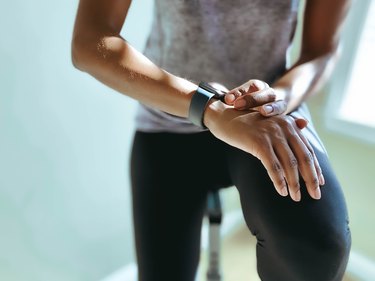
There are many things to consider when comparing an exercise cycle versus a treadmill. Both effective forms of cardiovascular exercise. Each come in a variety of sizes, brands and models, and both can come with adjustable settings for resistance, programs and times.
Many models include pulse rate indicators on the handles. But when it comes to choosing which machine is best for you, it's important to know about the major differences that will affect you.
Video of the Day
Video of the Day
Research Size Limitations
A treadmill can accommodate the size of most people, while a bike has more stringent size requirements. While both machines have weight limits, a bike may not always accommodate larger persons.
The space between the seat and the main control panel may not be wide enough for a larger person, and the seat may also not provide enough support for a larger person to sit comfortably.
In addition, most bikes require the knee to bend close to 90 degrees, so people with special knee conditions that limit bending may not be able to make a full revolution.
Consider Your Fitness
Treadmills simulate walking on flat or inclined surfaces, which will cause some force to be exerted through the legs and into the spine. People who do not have issues with walking will generally do fine when using a treadmill.
People with special spine or lower extremity conditions may prefer an exercise bike versus a treadmill, because a bike reduces stress and impact on the ankles, knees, hips and spine.
Because you are in a seated position, the bike is a relatively low-impact exercise machine. These machines are also available with a recumbent seat, as demonstrated by ExRx.net, which is ideal for someone with severe arthritis or back problems.
Recognize Safety Concerns
A fall from a treadmill or other motorized exercise equipment is one of the most common gym-related injuries, according to a December 2015 article published the journal Injury Epidemiology.
Even when holding onto the rails of a treadmill, people often get distracted. Even people without balance issues can sometimes lose their footing once in a while, and this only needs to happen once for a fall to occur.
There is a safety clip that will shut the machine off if you get too far away from the front — on most machines — but don't count on this to stop before a fall has started.
In addition, walking on a treadmill puts a significant amount of weight through the spine and joints of the leg, so people with issues relating to the spine and lower extremities may find a bike to be a better fit.
Count the Calories
In general, people tend to burn more calories on a treadmill than a bike. On a treadmill you are weight-bearing and you are more likely to move your arms and torso. This in turn means more muscle activation and more calories burned.
On recumbent bikes, the upper body is usually inactive. Bikes that are upright with moving arm handles do get the arms and torso moving, but they still don't offer the benefits of full weight bearing as provided by the treadmill.
According to Harvard Health Publishing, a person weighing 155 pounds will burn 298 calories in 30 minutes of running at 5 mph on a treadmill. Riding a stationary bike at a moderate pace will burn 260 calories for the same individual.
To burn more calories with an exercise bike versus a treadmill, you'll have to work a little harder by turning up the intensity level on the bike.
Read more: How to Ride an Exercise Bike
Making a Decision
Financial considerations are major factors when choosing between a bike and a treadmill. Although both can be found at reasonable prices, treadmills tend to be a bit more expensive.
If purchasing a piece of equipment for your home, space can be an issue. A treadmill will take up more space than an exercise bike and will be much heavier and more difficult to move, which is another convenience factor to consider.
Was this article helpful?
150 Characters Max
0/150
Thank you for sharing!
Thank you for your feedback!